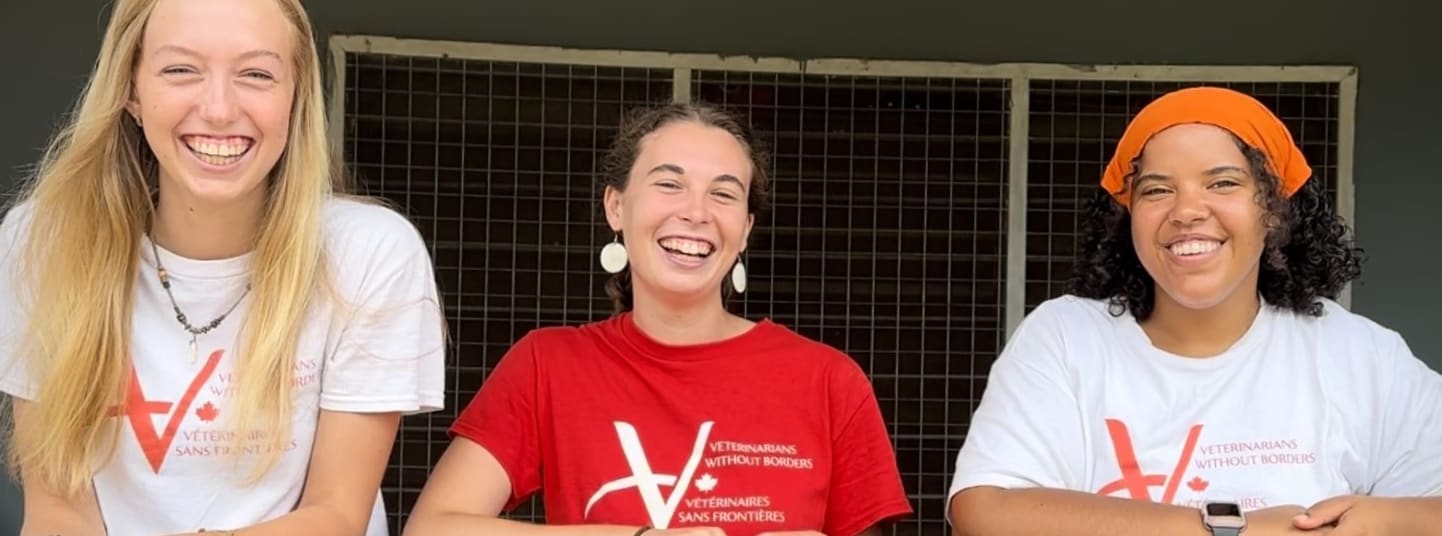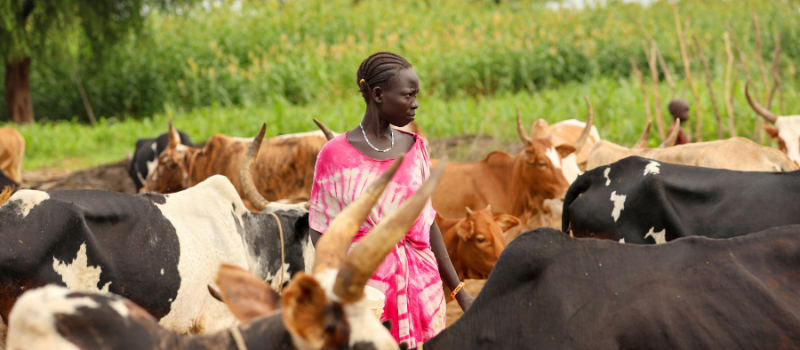#VETSVolunteerVoices aims to bring you the stories of our passionate VETS program volunteers from the field! In their own words, volunteers reflect on their work, development challenges, and the personal growth that they have experienced during their placements. Learn more about our VETS, (i.e., Volunteers Engaged in Gender-Responsive Technical Solutions), program and the important work being carried out by Canadian volunteers and local partners in Cambodia, Ghana, Kenya, Laos, Senegal, and Vietnam. This program is generously funded by Global Affairs Canada.
VETS VOLUNTEER: Sandra Nyman (OVC, 2026)
PLACEMENT: VETS YVP, May-August 2023, Ghana
INTERVIEW DATE: July 24, 2023
Q: What motivated you to be a VETS Volunteer?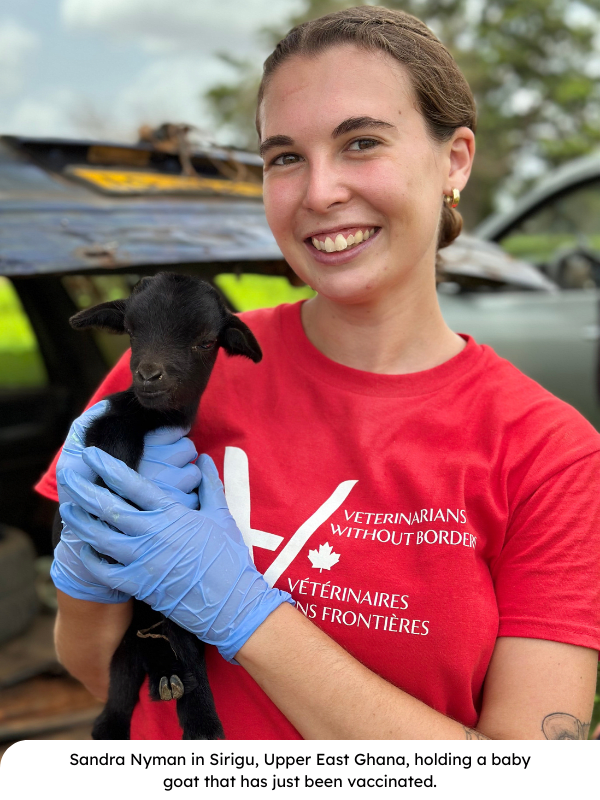
A: I was inspired to become a VETS volunteer because I really feel that my veterinary education is incomplete without an understanding of the challenges that are faced by international communities and how vets can play a role in their success. I also want to take the skills that I learn through this experience back to Canada, particularly regarding sustainability and One Health, so that I can apply them in my future career as a vet. I am going to be starting the second year of my DVM degree at the Ontario of Veterinary College in September, and I think that gaining experience in international development work early on in my degree is valuable as I move forward in my education.
Q: What has your work (placement) been in Ghana?
A: Importantly, we partnered with an organization in Ghana called GAPNET – the Ghana Poultry Network – during our work placement. In discussion with GAPNET, we planned our work activities to focus on the needs of Ghanaian locals. I think this - local partner collaboration – is a key strength of the VETS program, ensuring that our work here is participatory and sustainable.
Together with GAPNET, we worked on several different projects, all in the Upper East district. For example, we spent five weeks supporting a vaccination campaign for PPR – or Peste de Petits Ruminants – a highly contagious disease that affects goats and sheep and causes high rates of animal mortality in Ghana. We travelled to 13 different communities within the Upper East and helped to administer over 5000 vaccines.
We also spent two weeks facilitating training sessions on animal husbandry and biosecurity for small ruminants and poultry in 7 different communities, also in the Upper East. The training sessions were targeted towards women’s groups, although men were often in attendance as well.
In addition to these activities, we are working on a One Health research project surrounding disease surveillance and how different members of the veterinary system, including veterinary staff, GAPNET/VWB trained Community Animal Health Workers (CAWHs), and farmers contribute to monitoring disease.
Q: How did this experience impact your understanding of “One Health”?
A: Living here in Ghana, particularly in the Upper East, you really see the concept of One Health in real time. The system of animal rearing here is almost completely free-range, meaning that animals are left free to roam around on their own most of the time – many people do have housing for their animals and bring them inside at night, but not everyone does. The only exception to this is in the wet season, as the animals are tied up outside to prevent them from eating the crops. As a result of this system, animals, people, and the environment are completely overlapping, significantly contributing to the risk of disease transmission.
In fact, through our work on the One Health research project on disease surveillance, we have learned a lot about how monitoring and responding to animal disease is linked closely to human health. For example, during our time in Ghana, there was an anthrax outbreak in the Upper East that resulted in human illness and the death of at least one individual. This was likely due to a lack of education on the disease (i.e., importance of not consuming the meat of an animal who has died of anthrax) and a lack of access to veterinary care.
Q: How did your placement involve and empower women in Ghana?
A: Women are often the individuals that care for animals in Ghana, so it is very important provide them with the knowledge and skills necessary to raise healthy animals. So, as part of my placement, we (myself, two other volunteers and GAPNET) delivered training on animal husbandry and biosecurity to women across the Upper East district. Specifically, each region that we visited had an organized women’s group that engages women in the community on various issues, and so we invited these women’s groups to our sessions. They will be well placed to share and spread the knowledge to women throughout the Upper East region of Ghana.
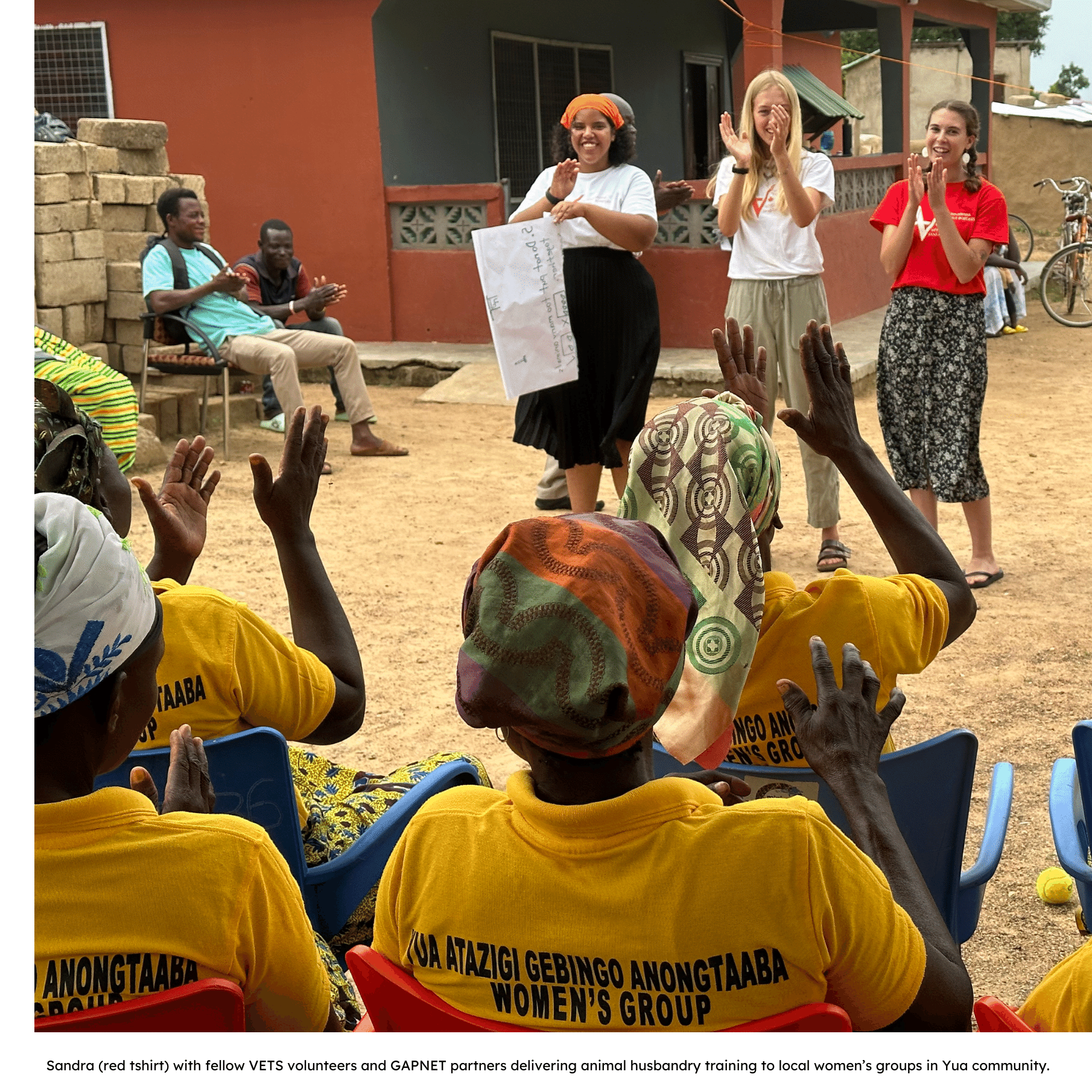
We also focused on having women participate during our training sessions. It is common here for men to speak more than women, but we tried to address this by encouraging women to answer questions, and by framing topics around women’s experiences. For example, when we were discussing the care of pregnant or post-partum animals, we specifically engaged the women in the group to discuss their own experiences with pregnancy and motherhood.
Q: Did this experience change you in any way?
A: Yes, I would say this experience changed me in a few different ways. Personally, I feel the pace of life here in Yua - the very small community that we have been staying in for the past few months – is much calmer than what I am used to in Canada. That’s not to say that there isn’t a lot of work being done! The people here in Yua work incredibly hard - they manage their farms without any machinery, sewing seeds, weeding, and harvesting all by hand, and ploughing using donkeys or cattle to pull manual ploughs. However, I feel like free time is often spent sitting outdoors, chatting with family and friends, dancing, or listening to music, and I really enjoy this life without all the constant distractions of technology.
People here are also very dedicated to their communities, and many people will come together to help in building a house or fixing a road. There is a strong feeling of caring for your neighbors and community, a value that I want to take with me back to Canada.
Q: What advice do you have for someone who is thinking of joining the Young Volunteers Program?
A: My advice would be, do it! Before I applied to the Young Volunteers Program, I was hesitant. I had never participated in international development work, and I hadn’t done that much international travel. But I wanted to take the chance to have an adventure, learn about a culture that is different than mine, and to gain skills and intercultural competence that I could take back with me to Canada. I also wanted to be able to have an impact on the international community. In my time here, I feel that I have accomplished all these things and more. I have learned so much while I’ve been here and formed relationships and memories that I will value for years to come.
I would also advise any incoming students that the work will not always be easy, things will not always go your way, and there will be experiences that you have that will make you feel uncomfortable. However, if you are open minded, flexible, and willing to learn, you will have an amazing time.
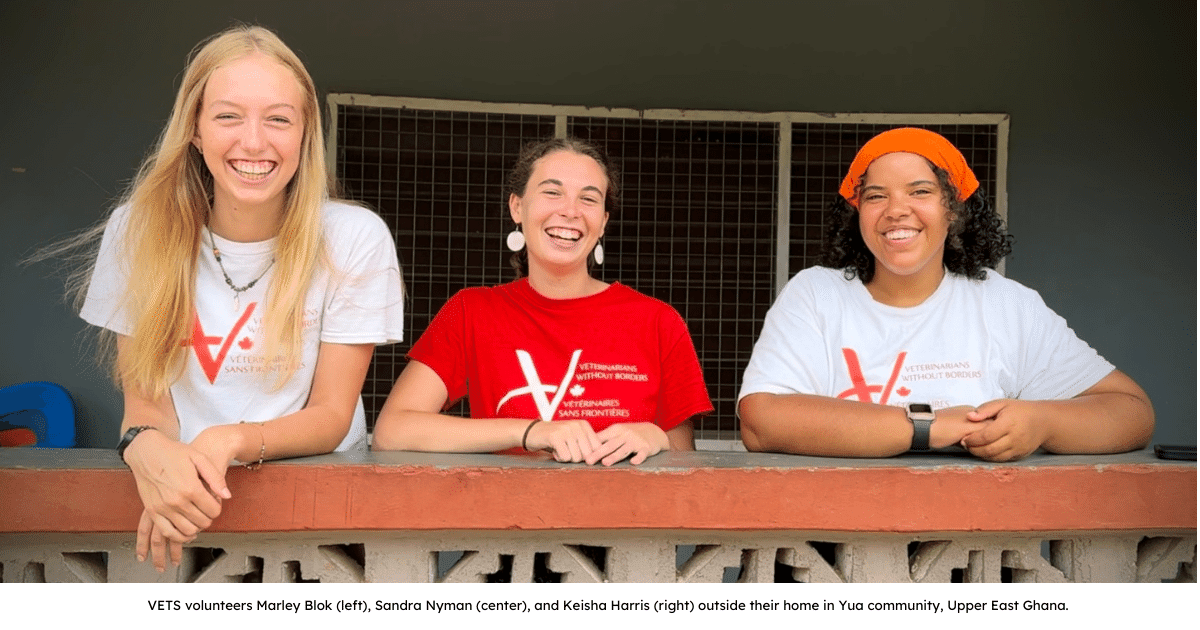
VETS is a 7-year initiative (2020-2027) to improve the economic and social well-being of marginalized people, particularly women and girls, in 6 countries across Africa and Asia. In collaboration with local partners, the program is implemented through 190 Canadian volunteers on international assignment and is generously funded by Global Affairs Canada. Learn more here.

